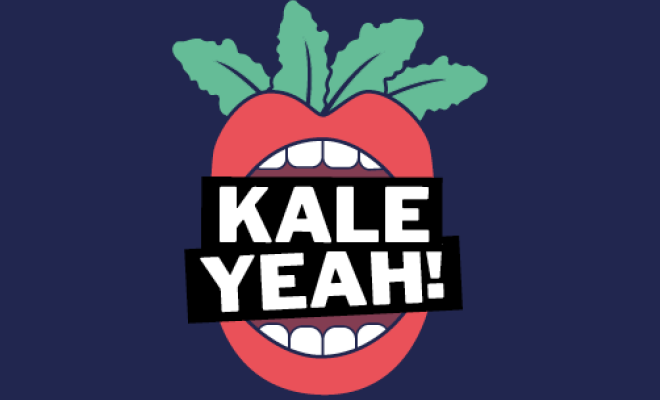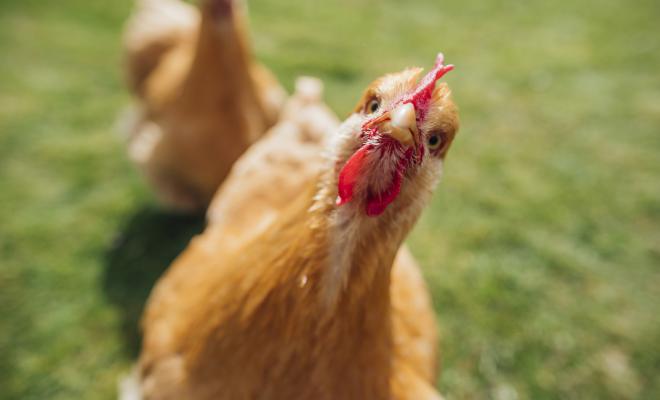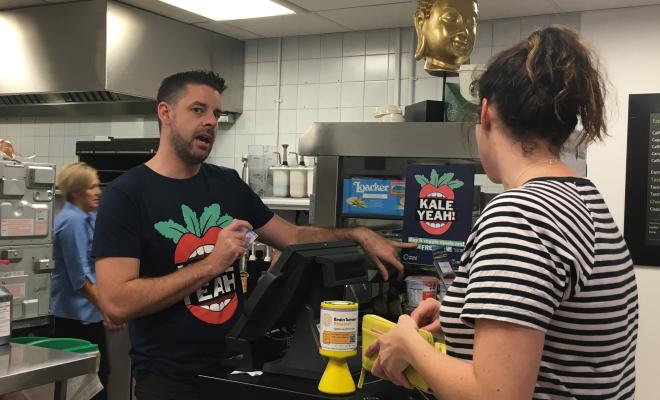13 Dec 2022
What's Kale Yeah! Kitchens?
Kale Yeah! Kitchens is a sustainability scheme designed to engage caterers in fighting the climate crisis, protecting nature and improving human health by adapting their menus.
It centres around serving less meat, fish and dairy, sourcing better (higher welfare) animal products and offering more plant-based options.
By becoming a Kale Yeah! Kitchen, you'll be working towards the recommendation from the government advisory body, the Climate Change Committee, that we reduce the consumption of all meat and dairy by 20% by 2030, and by 35% by 2050. Our resources will also help caterers meet the more ambitious target set by Friends of the Earth and our allies in the Eating Better alliance of a 50% reduction by 2030.
Why's eating less meat, fish and dairy important?
In the UK, we eat roughly double the amount of meat compared to the global average. Men in particular eat more meat than health guidelines recommend.
The importance of eating a balanced diet including more vegetables, wholegrains, nuts, seeds and pulses, and only moderate amounts of meat and dairy, is increasingly being recognised in national dietary guidelines, including the UK’s Eatwell Guide.
Eating less meat and fewer dairy products is an important part of tackling the climate emergency. Raising animals and growing their feed has a huge impact on the environment, causing 14.5% of global greenhouse gas emissions, and using vast amounts of land, water and energy.
Intensive farming produces high volumes of low-cost meat. It results in poor animal welfare as well as increased use of antibiotics, contributing to the global crisis in antibiotic resistance.
Making sure everyone has enough to eat is easier if we use crops to feed people rather than livestock. By halving the world’s consumption of grain-fed meat, we could feed 2 billion more people.
Friends of the Earth, along with over 60 organisations in the Eating Better alliance, is calling for a 50% reduction in the production and consumption of meat and dairy by 2030.
Fish
Often when people are trying to cut down on meat, fish is the easiest alternative, but it's not always a better option. A third of global fish stocks are now being fished at biologically unsustainable levels, according to the UN's Food and Agriculture Organization (FAO). Fish farming is increasingly rapidly, often with serious environmental and animal welfare issues.
Public reaction
If I sign up to Kale Yeah! Kitchens, will it be a success with students?
Sustainability is a major concern for today’s students. The United Nations Educational, Scientific and Cultural Organization (UNESCO) reports that, globally, 91% of students “agree their place of study should actively incorporate and promote sustainable development.”
In 2019, the National Union of Students (NUS) launched a charity, Students Organising for Sustainability (SOS), with the intention of urgently pushing NUS sustainability campaigns further and faster.
According to Sodexo’s 2017 International University Lifestyle report, 60% of UK students expect vegan or vegetarian food to be available on campus. The University Caterers Organisation's (TUCO) 2018 Student Eating and Drinking Habits report found that 27% of students are concerned about whether food is fair trade, ethically farmed or free range.
Signing up to Kale Yeah! Kitchens is a way to show your students you're serious about sustainability and the other issues they care about.
Will there be a backlash from meat-eaters if we serve less meat?
If people understand that the reason for reducing meat on offer is to lessen the university’s environmental footprint, and if the food is delicious, then this shouldn't be a problem (see also "Should we ban beef?" below).
In general, the biggest consumers of meat-free foods are "flexitarians" – people who are actively reducing the amount of meat they eat. Market research company Mintel reports that nearly two-thirds of people in the UK now choose to eat meat substitutes.
Researchers at the University of Cambridge carried out a study into how changing the menu to feature more meat-free options could influence buying patterns. They analysed more than 94,000 meals purchased at university college cafeterias and found that doubling the vegetarian options from 1 in 4 to 2 in 4 meals increased the proportion of plant-based purchases by 40-80%, and didn't negatively impact overall food sales.
The biggest increases in plant-based purchasing were among customers who'd previously consistently picked meat or fish, ie meat-eaters. This shows that meat-eaters are more than happy to eat meat-free when there are tasty and varied options available.
Cost
Will it cost more to offer more plant-based food?
Around the world, many people depend on pules, grains, vegetables, nuts and seeds to meet their dietary needs, with meat being eaten sparingly. Dishes such as rice, beans and lentil dahl are nutritious, delicious and affordable.
Some meat-free meals may take longer to prepare (increased chopping time, for example), but careful menu design can mitigate this.
In some cases, the cost of like-for-like meat and dairy alternatives (for example, plant-based chicken and dairy-free cheese) may be more expensive, but it's possible to create delicious plant-based dishes without using these products.
It's worth noting that if you're sourcing very cheap meat, it's likely to come from systems with poor animal welfare, something we'd encourage caterers to move away from.
Organic is the gold standard for both animal welfare and environmental impact, and would be the first choice for meat, dairy and fish where possible.
As a minimum, we recommend sourcing meat that's "RSPCA Assured", fish certified as sustainable by the Marine Stewardship Council or Aquaculture Stewardship Council, and free-range eggs.
Will giving away food via a loyalty scheme cost me money?
It should do the opposite. A loyalty card is a great way to attract and retain customers. By linking it to the booming demand for plant-based food, you can build a loyal customer-base that'll keep choosing you over your competitors.
As well as making frequent purchases, loyal customers are also likely to spend more per visit. Research carried out by the Harvard Business School looking into customer retention found that even a 5% increase in customer retention could lead to a 25-95% increase in profits.
A survey carried out during the pilot Kale Yeah! loyalty scheme at Portsmouth University found that over half of respondents said the scheme would make them more likely to choose a veggie meal, and half also said that the scheme would make them more likely to eat at a university café.
Sustainability
Can Kale Yeah! Kitchens help us meet our sustainability targets?
Animal agriculture is the second biggest contributor to human-made greenhouse gases after the fossil fuel industry. Actively reducing the amount of meat and dairy products that are procured is an immediate way to reduce an establishment’s carbon footprint.
Each year, People & Planet (the largest student network in the UK campaigning for social and environmental justice), publishes a league table that ranks UK universities on their environmental and ethical performance. Implementing Kale Yeah! Kitchens and reducing the amount of meat you serve could help your university move up the People & Planet University League.
Should we ban beef?
Beef has come under the spotlight, along with lamb, for its high direct climate-changing emissions. Cattle and sheep are ruminants and so produce methane – a potent greenhouse gas – as they digest their feed.
As a result, several universities have implemented beef bans, with mixed results depending on how the ban was brought in. In some cases, where the decision was made without much discussion. it's led to uproar and the ban being overturned.
The full environmental impact of meat and dairy is complex. Not all beef production has the same impact. There's a world of difference between, on the one hand, intensive cattle feedlot systems in the US and ranching on deforested land in Brazil, and, on the other, more sustainable pasture-based grazing systems in the UK.
A shift away from beef can unwittingly lead to people eating more intensively-produced chicken – a disaster for animal welfare and the environment due to its reliance on imported soy feed, often grown after forests and other precious habitats are cleared in South America.
That’s why we recommend reducing all meat – red and white – as well as fish and dairy, and for the produce that's on the menu to come from systems with higher environmental and animal welfare standards.
SOS have put together a statement supporting a less and better approach: "Why banning beef is not the answer".
If you're still thinking about implementing a ban on beef, it's key to engage students in the discussion from the start, working with the Student Union or through other fora.
If you present people with an opportunity to air their views and make a democratic decision, there's a better chance of any proposal being successful. If students feel like they've had their choice taken away, it's possible it'll not be well received.
How do we get started?
We’ve made it easy for any caterers to join. All you need to do is agree to the Kale Yeah! Kitchens pledge, and then use our resources to get going on rebalancing your menus. It’s easy to make changes that’ll have a big impact, while keeping your customers satisfied.




